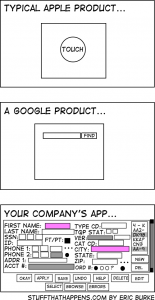Leslie Watkins
first-year grad student, Computer Sciences
Interests? My interests lie mainly in interdisciplinarity and cognitive science. I have particularly enjoyed learning about graphics and visualization (which is why I’m here).
Since I’m interested in visualization as a science and I don’t have a specific “domain” to apply it to, I guess I would fall somewhere near the Vis Scientist category.
Expectations? My expectation for this class is to learn about the scientific rigor applied to a field that I have previously thought of as being guided primarily by subjective principles.
Skills? I came here last semester knowing Matlab, and have since learned C++ in what could best be described as a baptism by fire.
I’m a first year grad student in the CS department working towards a masters degree.
Before coming to Madison I received my Bachelors degree in computer engineering from MSOE and worked for about three years after that. Highlights of my career include working on embedded systems with PIC microprocessors, doing data analysis and later quantitative trading for a hedge fund, and controlling printer finishing equipment at Quad/Tech.
After all of that, I decided that I wanted to work in the computer animation industry and so I applied to Madison to focus on computer graphic for a few years before diving in. I’m interested in pretty much anything that has to do with computer animations including modeling, rendering, and animating.
I’m interested in the vis class because there is an awful lot of information to visualize when dealing with all aspects of computer animation. A big part of the animation industry is now bringing down costs and making production processes quicker. Better methods of visualization could be key to this task.
I’m also interested in vis from an educational stand point. I good visualization can mean the difference between leaning a complicated subject or being completely overwhelmed by it. I’m interested in any methods of making difficult subjects such as transient analysis of linear circuits easier to understand through good visuals.
From that description, I would say that I fall between vis science and domain science. As far as my expectations for the course go, I would like to see some of the interested ideas I’ve had for visualizing circuits and math problems come to light as small projects. I’d also like to get an idea of what “works” in terms of visualizing different types of data.
My skill sets pretty much include C++/C and Java for programming languages and a decent ability to to work spacially. I’ve done some work with web development inclucing php and database work although I don’t consider myself a pro. Durring my down time I like to play the guitar and drums, draw picturs, watch movies (computer animated) and play video games.
Here’s a picture of me

Unfortunately, I don’t have a personal website that’s worth looking.
Emma Turetsky
Department: Computer Sciences
1st year grad student
My interests are in PL and Graphics (varied, I know.) I have a strong interest in various ways of turning 2D v0lumetric data into 3D images, specifically in brain scans. I suppose I see myself as a Vis Scientist (I wasn’t in class, so I don’t know the specifics of the different perspectives), but I want to make tools to better visualize data, so maybe a designer as well.
I hope to learn what makes a “good” visualization versus a “bad” one. And maybe learn techniques that are used to make visualizations.
I’m confident in Java and C++ as well as Scheme and other ML like languages. I also have a background in Prolog if that would at all be useful.

